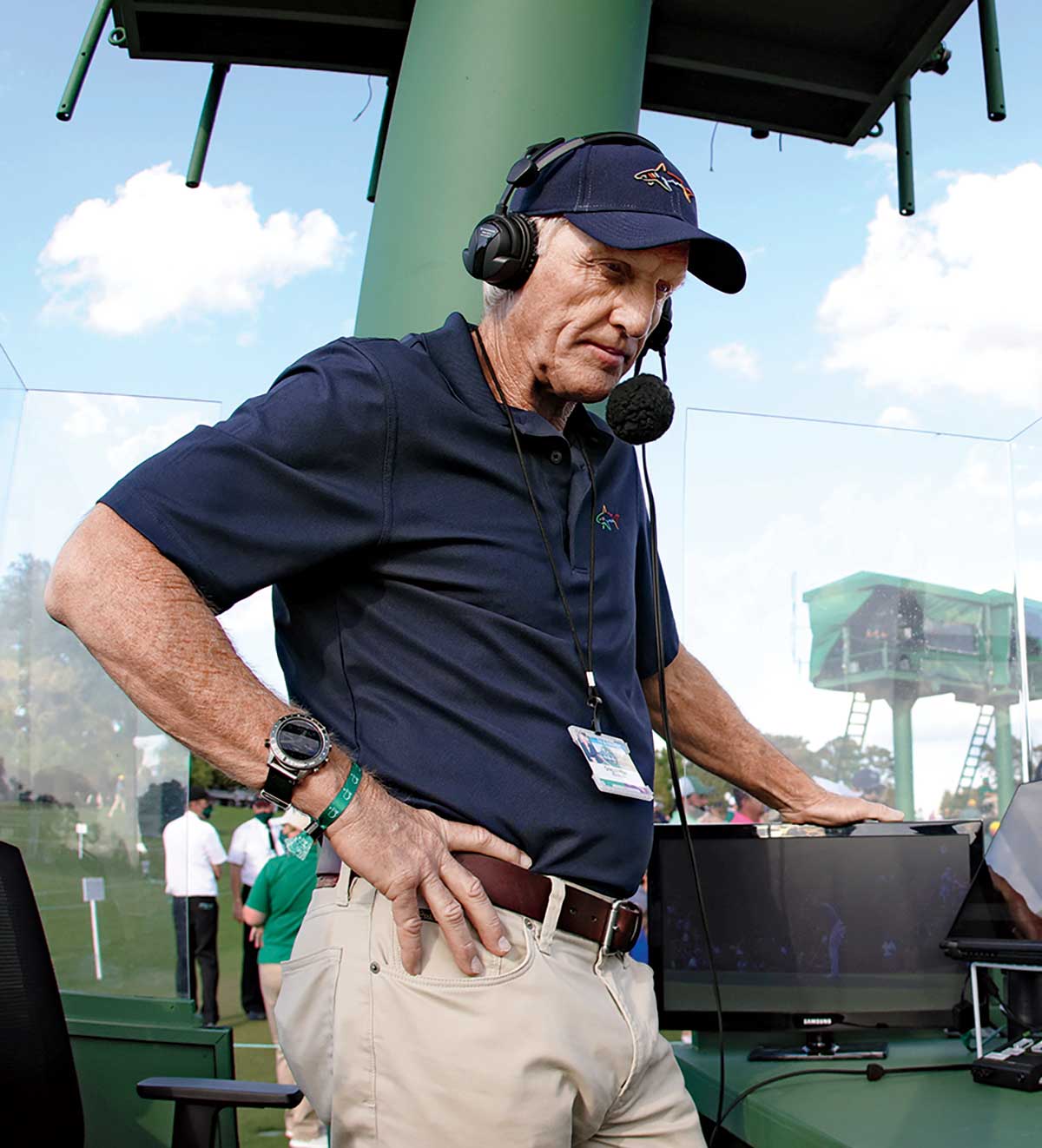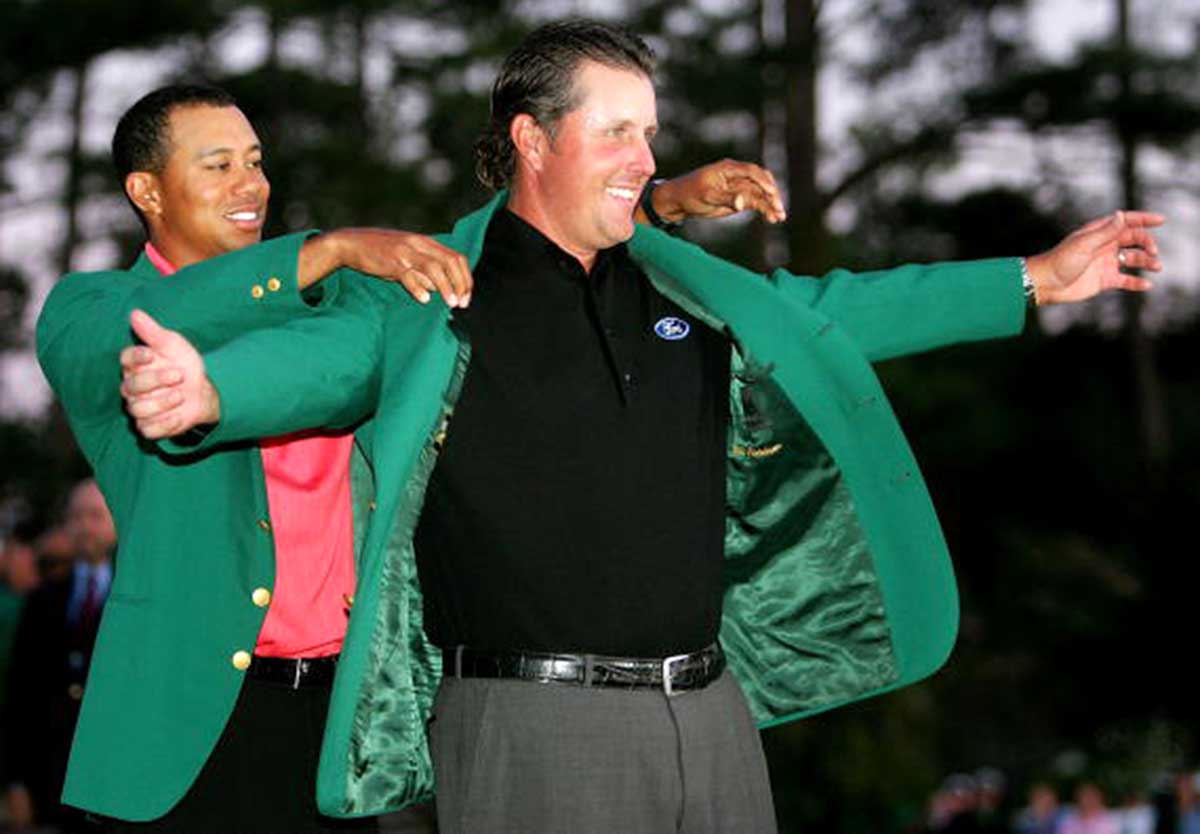
Hello, friends, and welcome to the first Masters since the outbreak of golf’s civil war.
No, Jim Nantz isn’t going to say that. But he might think it. A lot of people probably will.
How could the thought not cross a golf fan’s mind in advance of the game’s most prestigious invitational?
As they have each spring, since 1934 — aside from a pause during World War II and an autumn one-off during the pandemic — the greatest players on the planet will soon gather at Augusta National Golf Club to compete for a green jacket and a place in history.
Same as always, except not exactly.
There’s no getting around it. A conflict has erupted in the men’s professional game, and this year’s Masters field will feature foot soldiers from both sides of the fight.
Not that bad blood is apt to spill into the open. Not at Augusta. No grounds in golf require more decorum. Everyone is on their best behavior. The tumult of the world doesn’t tend to make it down Magnolia Lane.
Given the surrounds, it is unlikely that Patrick Reed will toss a tee in frustration at Rory McIlroy, as he did recently on a range in Dubai. In such a polite setting, Billy Horschel won’t be redeploying terms like “liar” and “hypocrite,” as he has in heated moments. Nor will Tiger Woods, as he rounds Amen Corner, be subpoenaed as a witness in any of the lawsuits flying back and forth. That has reportedly only happened at his Florida home.
“That’s one of the beautiful things about Augusta,” says 2016 Masters champ Danny Willett. “It’s a special tournament and a special atmosphere. You’re focused on one thing and one thing only. When we all get there, hopefully, all the nonsense goes away.”
Still, no nonsense doesn’t mean no drama. This year’s Masters is threaded through with subplots that are clear to anyone who has been following the script.
Flip back through the pages to around this time last year, when the coming clash in the game was still a distant rumble. LIV Golf, the Saudi-funded challenge to the PGA Tour, was just starting to take shape. In April, not long after the 2022 Masters, LIV announced that it had enlisted players for its first event, but it wasn’t ready to name names.
That was then. The breakaway league is now underway in its second season, and battle lines have hardened. Suspensions have been levied. Tensions have flared. Along with a tangle of litigation, a federal antitrust investigation has been launched. It’s an all-out struggle, with access to events as one of its main fronts.
Of all the territory in dispute, none is more prized than the majors. From the moment LIV was born, a critical question was whether its players would be blocked from the four biggies, with the Masters, in many eyes, being the biggest of them all.
So far, nothing has stood in their way.
At the 2022 U.S. Open, the USGA upheld invitations to LIV golfers. A month later, the R&A followed suit at the Open Championship. Both governing bodies have since indicated that they’re poised to do the same in 2023. Only the PGA of America, which runs the PGA Championship, has yet to make its position on LIV players clear.
Getty Images
As for Augusta National, it revealed its stance in December in a measured statement from club chairman Fred Ridley: LIV golfers would not be banned in 2023.
In announcing that allowance, Ridley acknowledged the broader context.
“Regrettably,” he said, “recent actions have divided men’s professional golf by diminishing the virtues of the game and the meaningful legacies of those who built it.”
But what was there to do?
“[O]ur focus,” Ridley said, “is to honor the tradition of bringing together a preeminent field of golfers this coming April.”
The best of the best going head-to-head. That’s what Augusta wants. It’s what most fans and players desire, too, even those who have complained that LIV golfers are trying to have their cake and eat it too by defecting to another league, then returning to cherry-pick premier events. The majors are called “majors” for a reason.
To LIV’s staunchest critics, though, the issue runs deeper. Allowing the league’s players back onto the game’s brightest stages, they say, gives the Saudi league a platform it doesn’t deserve.
“It’s clear these guys are trying to use [the Masters] to promote LIV and confer legitimacy on the league,” says Golf Channel analyst Brandel Chamblee. “It’s an attempt to normalize what should not be normalized.”
Chamblee is talking about the big picture. Narrow the lens, and you can see a lot of ways things could get weird.
There are too many things to take care of to start worrying about PGA Tour against LIV players. Augusta is challenging enough without thinking about little things like that.
One that stands out is Tuesday evening of Masters week, when past winners of the tournament swing open their lockers, slip on their green jackets, stride into the Founders Room on the second floor of the clubhouse and assume their usual spots for the most exclusive meal in golf.
Though there is no assigned seating at the Masters Champions Dinner, there are customary place settings. Ben Crenshaw camps out at the head of the table, next to the club chairman and the defending champ. Tiger takes up a post alongside Mark O’Meara. Ray Floyd rubs elbows with Fred Couples, while Nick Faldo and Vijay Singh flank Gary Player, whose fellow South Africans Trevor Immelman and Charl Schwartzel cluster with the Aussie Adam Scott. So go the unofficial arrangements, shaped by age, geography and disposition.
For nearly a decade, Bubba Watson, the 2012 and 2014 Masters winner, has sat beside his Bible-study mate Zach Johnson, sipping water instead of wine, savoring the camaraderie and the cuisine and, he says, “just trying to soak it all in.”
Like so much of the week, the dinner abides by ritualistic rhythms. After cocktails and hors d’oeuvres, speeches by the chairman and the reigning champ give way to old-time storytelling that doubles as a celebration of the man — 2022 Masters winner Scottie Scheffler — who chose the evening’s menu.
This year, Watson says, he expects the same. Kind words. Good vibes. A festive gathering in honor of the game and last year’s Masters winner. Never mind that Watson has joined LIV.
“Scottie is a great friend,” he says. “So it will be fun to be there with him and support him.”
It’s a sweet sentiment that leaves a lot unsaid. For a more complete assessment, it helps to have the input of other guests. Take Woods, for instance. When asked recently to forecast the atmosphere around the table, the five-time Masters champion said he couldn’t say for sure, but he figured things were destined to get awkward.
Top priority, of course, was to raise a glass to Scheffler. But, Woods said, there was also no ignoring “the nature of what has transpired and the people that have left, just where our situations are either legally or emotionally. There’s a lot there.” At an otherwise rarefied event, past Masters champs will be playing a game with which many of us are familiar. Like family members at a polarized Thanksgiving dinner, they’ll be eating — and biting their tongues.
And then a competition will begin.

Getty Images
Ask most players, and they’ll tell you that once balls are in the air, no one inside the ropes will be dwelling on the extras.
“You’re focused on trying to win the tournament,” Willett says. “That’s it.”
García, who won the 2017 Masters and jumped to LIV last year, agrees. “There’s too many other things to take care of to start worrying about PGA Tour against LIV players,” he says. “I’m not saying that the media won’t do it, or some fans. But when it comes down to it, Augusta is challenging enough without thinking about little things like that.”
García’s fellow LIVer, Brooks Koepka, has a more pointed take. He dismisses the idea of bad blood between players as nothing more than a media narrative that has taken on a life of its own.
“It’s been blown up into a different situation than it really is,” Koepka says. “It’s just a business decision. We’re all the same people. We all get along.” If outsiders buy into the idea of a feud, that’s because it’s what the press is selling.
“The fans read whatever’s written. That’s their news source,” Koepka says.
He’s got a point — reporters need something to report — but it goes only so far. The media did not invent the suits and countersuits, or script chairman Ridley’s observation that golf has “reached a seminal point” in its history, or stage the recent dustup in the desert between Reed and McIlroy.
The two players have had other moments, including a Sunday showdown at the 2018 Masters in which Reed came out on top, depriving Rory of the last leg he needs for the career grand slam. Both men are headed back to Augusta. If they wind up in the final pairing again, it wouldn’t be a media fabrication to call it a fraught matchup — and must-see TV.
Nor would it hurt that McIlroy, a Tour loyalist, has been one of LIV’s most vocal detractors, laying into the league even while insisting that he harbors no resentment toward individuals over their career choices. That’s a common refrain in the game these days, repeated by players on both sides of the split: It’s professional, not personal.
But it isn’t always easy to separate the two. As Woods put it recently: “I know that some of our friendships have certainly taken a different path.”

Getty Images
No path through the game has drawn more attention in the past 12 months than the one blazed by Tiger’s longtime frenemy, Phil Mickelson. The three-time Masters champion withdrew from last year’s tournament during his self-imposed exile from the game, a retreat brought on by the publication of his now-infamous comments about LIV, the Saudis and his own involvement with the circuit.
At 52, Mickelson has said that he still has a few major victories in him. No tournament means more to him than the Masters; sitting out the event in 2022, as he chose to do, could not have been easy for him. Just as his absence was big news last year, so will his presence be this year, as he returns to Augusta for the first time since becoming the poster child for LIV.
Who will he be paired with? How will he play? You could ask the same of all the stars: Tiger, Rory and Scottie; LIVers Dustin Johnson, Cameron Smith and Reed. Such questions come up every April. But they feel more loaded this time around. The players themselves might downplay the difference, but, as many Tour pros have pointed out, it is what it is. A tradition unlike any other will unfold against a backdrop never seen before.
Next year, it could shift again. Chairman Ridley underscored that in his statement. Augusta National, he said, looks “at every aspect” of the tournament each year, including the “invitation criteria.” In the past, those criteria have included Official World Golf Ranking points. Whether and when LIV events will earn those points has yet to be determined. It looms as a contentious matter in the year ahead, as well as a reminder that the golf war is a long way from over.
The Masters should provide a welcome break from the hostilities but not an end to the underlying tension: a holiday truce, of sorts, but with a lot of shots fired and plenty riding on where they land.







